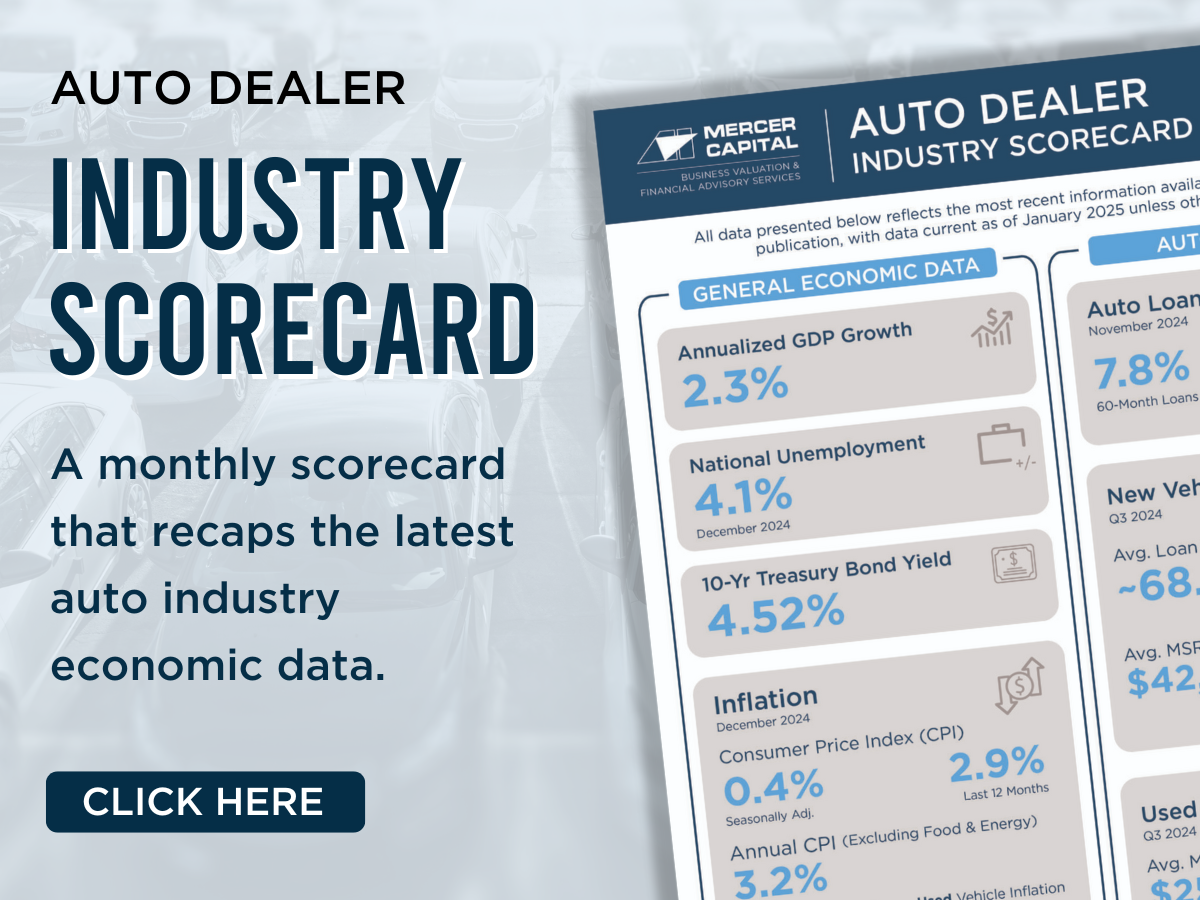Q1 2020 Earnings Calls
COVID-19 Causes Declines in Q1, but Executives Maintain Optimism Going Forward
Auto dealers stock prices declined in the first quarter of 2020 following the broader market trend. Though many dealers saw year-over-year gains in sales and earnings in the first two months of the year, earnings calls focused on the coronavirus pandemic. Volumes have fallen across the country, though executives pointed to recent positive trends. Downturns have muddied the M&A market, and some companies don’t plan to rehire everyone that has been let go. Many praised the support of OEMs including significant incentives such as 0% financing. With dealership doors shuttered, many executives touted their online presence, though there was not a consensus on digital’s long-term place in the market.
CarMax (stock price -4% year-to-date May 26th) and Carvana (+48%) have performed better than traditional franchised dealers (-23% on average), pointing to the strength of this business model during this time. Vroom, Inc., another online used car seller, even filed for an IPO despite the significant macroeconomic headwinds and recent poor performance of auto-adjacent tech-company offerings. If the offering occurs as scheduled and performs well, this bodes well for AutoNation, who owns about 7% of the company after a $50 million investment in late 2018. In mid-April, AutoNation granted its CEO, Cheryl Miller, a leave of absence for health reasons. They also returned their PPP loan well before the Safe Harbor Deadline (most recently postponed to May 18th) due to shifting guidance about eligibility. It should also be pointed out that their eligibility as one of the largest auto dealers in the country drew ire from the public.
AutoNation wasn’t the only public auto dealer facing its own issues amid the market turbulence. Asbury scuttled their $1 billion Park Place transaction, which included $10 million in damages, not counting other expenses incurred related to due diligence and financing. This would have been one of the largest transactions in the auto dealer space in years. Penske waited until after their earnings call to announce they were cutting their dividend, “consistent with the other measures the company has implemented the impact of COVID-19.” The S&P 500 has rallied significantly from March lows due to significant liquidity injections and optimism of a quick “V-shaped” recovery, but there may be more room for it to fall if more companies like Penske and Group 1 have to cut dividends.
Theme 1: April was the worst month for national sales volumes in decades. However, recovery has been evident on a weekly basis even throughout April as companies ramp up their digital capabilities.
- In the U.S., our workshops have generally remained open, unlike many of our showrooms, but the flow of service customers has been down 40% to 50% since mid-March, simply because most of our customers have been living under shelter-in-place orders. The closure of most of our U.S. showrooms since mid-March has reduced new and used vehicle sales by a similar percentage. […] As April progressed, we began to see some rebound in our week-over-week sales base in the U.S. market. For the final week, retail unit sales were down approximately 25%, and service revenues were pacing about 30% lower than prior-year levels. -Earl Hesterberg, President and CEO, Group 1 Automotive
- During this period, our overall vehicle sales volumes fell roughly 40% compared to the prior year. […] In the past week though, the year-over-year vehicle sales declines have improved to roughly 30%, with used vehicle sales being slightly more resilient than new vehicle sales. Parts and service gross has also improved over the past week as states begin to relax their stay-at-home orders and customers begin to return for delayed repair and maintenance work. -David Bruton Smith, CEO and Director, Sonic Automotive
Theme 2: Coronavirus has accelerated the push to digital, resulting in heavy investment which means online shopping will continue beyond the pandemic. However, some executives believe consumer preferences and their (lack of) understanding of financing options will continue to be roadblocks to fully online.
- I think that [digital] trend was already underway where the value of a brand and experience and a warranty/guarantee has all been expressed as a consumer of things that are valued and there’s been a movement towards companies like AutoNation with One Price, CarMax, Vroom, Carvana. […] I think for digital, this whole disruptive period with corona is an inflection point from which there’s no turning back. […] You need first-class digital capability; you need a safe environment for your customers and a safe environment for your associates. That is the Holy Grail going forward. We see no difference in profitability between the digital channel and the traditional challenge whatsoever. -Michael Jackson, Chairman and CEO, AutoNation
- [W]e believe that about half of the consumers today would really prefer to be able to buy cars in the comfort of their own home. We are seeing though that there is still many of the consumers and we’ve narrowed it down that we think that about 20% of the consumers have the ability to [complete the car buying process] by doing it digitally and doing it all from home without human interaction. The other 80%, we really believe even though they want to that’s the biggest impediment not the desire, but consumers just don’t have the ability. -Bryan DeBoer, President and CEO, Lithia Motors
- A lot of customers that come in whether they don’t know what they’re looking to acquire, they don’t know the kind of vehicle that they want for their family or they have some financial issues. As we’ve said before, you know, our average consumer has $5,100 of negative equity that they’re working to, you know, leverage our finance specialists to help them find the right solutions for them. -Chris Holzshu, EVP and COO, Lithia Motors
Theme 3: Auto dealers cut headcounts to manage SG&A expenses, but not all these jobs will return when markets stabilize due in part to digital. Some are optimistic they will bring everyone back, and most directly relate rehiring to the rate at which business returns.
- I don’t know that [headcount related cost saves are] near-term, I think what we have to do is understand what will be the footprint of our business. How much will be digital? How much will be done from home? How many people we have actually working in the operations? […] As we see the number of people we have furloughed and as a business going [forward will] be decided by how business comes back. -Roger Penske, Chairman and CEO, Penske Automotive Group
- We didn’t furlough any technicians. Because of our cash position and how we manage our expenses [the quarter could have been better] had we just cut the normal expense as you would in a typical recession. We believe that this was going to be temporary. And eventually, the business was going to come back. […] we have strong metrics that will dictate to us when we bring people back. And when we see those metrics starting to be achieved, we’ll certainly bring people back at that time. The folks that we’ve furloughed, we communicate with them consistently, and we were hopeful one day to bring them all back. -David Hult, President and CEO Asbury Automotive Group
- We’ve bought back 1,000 associates thus far, meaning that our staffing reduction is around the same as the business reduction. There is no predetermined cadence or plan as to when we bring back additional employees. […] [I]f I look back to 2008 and 2009, I would observe re-staffing trailed the improvement in business. […] And what other efficiencies and effectiveness around digital is figured out or we come to grips with, whether that leads fact that we hire everyone when we ultimately have a full recovery in our back, well, I can’t answer that today, other than I can say, rehiring will trail the growth of the business. -Michael Jackson, Chairman and CEO, AutoNation
Theme 4: M&A has been delayed or canceled due to the coronavirus as buyers aren’t willing to pay what sellers want with earnings deteriorating. Executives believe consolidation will ultimately resume and companies focused on maximizing liquidity may be best positioned for such acquisitions.
- As we saw business decline, we acted decisively to fortify our business to prepare for the inevitable slowdown. Unfortunately, this included canceling the Park Place acquisition […] we thought the Park Place deal was going to be a transformational deal for us, and it was a heck of an acquisition, but things happen. On the other side of that coin, we’re sitting on a lot of cash and probably the lowest net leverage ratio we’ve had. […] I think we need to see the dust settle a little bit. There is some activity out there. […] I don’t want to comment on [reengaging] the Park Place transaction. But we feel like from a cash position and where we’re sitting operationally, we have the ability to be very flexible and being acquisitive when the right opportunities come. -David Hult, President and CEO Asbury Automotive Group
- I think it’s going to be brand-by-brand where you have your strengths and also we have scale where you can consolidate some of the fixed costs, but I think it’s too soon to look at that. […] We would focus [capital allocation] today, probably investing in the used car business from the superstore perspective and also look at expanding our footprint get on commercial trucks side. -Roger Penske, Chairman and CEO, Penske Automotive Group
- We need to verify earnings quality that they’re within that 90% to 95% earnings level of what they were pre-COVID-19. So, those earnings quality verifications will determine the second half closing date or possibly even beyond that in the event that earnings quality hasn’t improved. There are chances that if earning quality doesn’t improve then we would actually renegotiate the transaction in terms of the goodwill amount as well. -Bryan DeBoer, President and CEO, Lithia Motors
- Our liquidity position, for us, is about as strong as it’s ever been. So as we come out of this, we do believe there’s going to be some M&A opportunities for us -Jeff Dyke, President, Sonic Automotive
Summary
Earnings calls this quarter were uniquely positioned. Despite much of the financial impact occurring in Q2, the demand shock caused by the coronavirus was so severe that many dealers saw a decline in Q1 figures. While things are expected to get worse in Q2, there is optimism as numbers continue to improve on a weekly basis. Still, it should be noted that volumes are becoming less negative, not reversing to positive in most instances. Hopefully trends will continue their positive trajectory by next quarter’s calls. Tough times are ahead for public and private dealers, but current investments in digital strategies may lead to some long-term benefits as a silver lining to this difficult situation.
At Mercer Capital, we follow the auto industry closely in order to understand not only recent trends, but how investors ascribe value to the public dealerships. These give insight to the market that may exist for a private dealership. To understand how the above themes may or may not impact your business, reach out to one of us, and we’d be happy to chat via telephone, email, Zoom, or whatever your preferred communication in this dynamic digital age.
 Auto Dealer Valuation Insights
Auto Dealer Valuation Insights 








